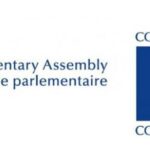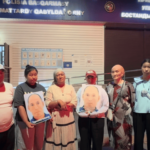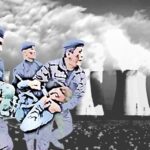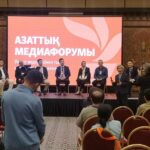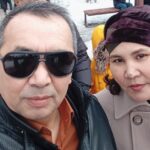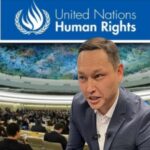Ladies and Gentlemen,
Members of the Central Eurasian Studies Society
I am here today to give you my assessment of the state
of human rights in Central Asia. But before we examine today’s situation, I need
to bring to your attention several theses that form the basis for my
assessment. In fact, these arguments are equally if not more important than the
assessment itself.
A few words about my background. I am a mining
engineer with a PhD in mining
economy. My second degree is in law and I have a
license to practice in court. But my primary occupation is as a human rights
advocate. I was born in mid the 20-th century. My grandfather was a Bolshevik
who brought Voronezh – a city in Russian empire – under the Soviet rule and in
30-ies was appointed deputy minister of health of the USSR. In 1938 he was
arrested and sent to Stalin’s forced labour camp where he died in 1942. Our
family was a dissident one. My father, professor of philology, faced criminal
charges for disseminating anti-Soviet literature. I lived in the Soviet Union
for most of my life, but never joined the Communist party. This background gives
me a number of perspectives on the current situation and its historic origins.
I believe that human rights situation in Central Asia
is strongly affected by the internal and external political context. Let me
start with several important theses.
One of them focuses on evolution of private property in
the region- a topic that is rarely mentioned when speaking of human rights. It
is, however, extremely relevant. The concept of private property, if put
simply, evolved in three areas: in the economy, as a legal institution and in
culture. Private property has also became an important factor in the evolution
of political systems. For many centuries it was a driving force in many social
processes. In the Soviet Union, people or, in other words, the state itself
owned all property, including the means of production. For 70 years this part
of the world was excluded from the global evolution of laws and practices
related to private property.
As a result, there is a big difference between the
concept of property in post-Soviet countries and the view of private property
in developed states. Property in our part of the world, in many respects, has
become a key element in the establishment of a neo-feudal systems.
In modern societies evolution of economic and legal
foundations for private property facilitated ideas of individual rights and
freedoms. In post-Soviet countries this process never took root.
My second thesis is that majority of post-Soviet
countries never went through a real change of elites in power. Governmental power
is still exercised by the same elite, the same people, who oversaw transit from
state-planned economy to market economy and private property. The privatization
of state property in the 90-ies was not transparent and led to accumulation of
vast wealth in the hands of the former communist elite. In many cases
privatization was done in violation of legal norms. Main beneficiaries of this
process have since become millionaires or even billionaires and established
control of national economies, but since the source of their wealth can be
legally disputed, they are also very vulnerable to political changes.
This is a critical point: Whenever there is a threat
of power changing hands, the wealthy elites come in danger of their property
being taken away, since the public is already convinced that this property was
privatized unfairly. Privatization of Soviet state property left behind a minefield
that is set to explode in case of serious power struggles. This vulnerability
coupled with the oppressive nature of political regimes prevents real political
competition and hinders any developments aimed at establishing the rule of law.
Since rule of law carries risks for the current political elite, political modernization
becomes impossible until this is somehow addressed. During his recent Freedom
House speech Mikhail Khodorkovskiy said that ‘redemption of social justice’ is
needed and I fully agree with these words.
My third thesis is about the current state of the
society. Unfortunately, Russia’s aggression in Ukraine is another proof that
post-Soviet societies suffer from a wide range of syndromes incompatible with
the modern human rights system. Some of
the values that guide these societies were acquired in distant past, other – in
Soviet times, and there are also syndromes that were reinforced by the social and
economic turmoil after the break up of Soviet Union. In USSR people have
habitually allowed elites to take all the decisions on political and social
welfare. The state and its ideology were never debated. People never acted as subject
of politics, they were always perceived as objects to be ruled, controlled and coerced.
Everything in the society was initiated by the state. There were public
organizations, such as women and children groups, veteran associations, trade
unions. There was also one political party, but there never was a civil society.
Until the early 90-ies.
But even nowadays, many Central Asian countries have
no civil societies, what they have is a ‘state-governed’ society, where authorities
use law-enforcement, state organizations and various state-sponsored alliances
to control the public initiative. Some post-Soviet states (like Kazakhstan,
Tajikistan and Uzbekistan) allow for so-called institutionalized dissent: a few
human rights organizations, singular independent media or charity
organizations. As for other areas — the relationship between the government
and the people is based on submission and limited choice, just like in Soviet
Union. In USSR people had no freedom to choose, and the skill of making a
responsible choice has never developed.
In these conditions individual rights and freedoms
never became a real value. The freedom of expression, association, public
assembly and religion — all of these rights are an abstract idea to the
post-Soviet societies. The need to preserve human dignity is also not enough of
a motivation. Members of post-Soviet societies in their majority are not ready
or willing to sacrifice comfort in order to preserve the dignity and rights of
minority communities. Human rights are not a value and people do not see any
practical purpose in protecting them.
Let me give you an example. Whenever a post-Soviet
society engages in discussion of prisoner rights, an argument that imprisonment
is a punishment in itself is never understood. When activists cite overcrowding,
poor health services or degrading treatment of prisoners as causes for concern,
public generally dismisses these concerns, saying that prisoners deserve to be
treated badly, since prison should not be a health resort. Moreover, the examples
of good conditions in British, Norwegian or Dutch prisons are taken negatively
and even with indignation. Explaining that imprisonment is a punishment in itself,
since it deprives a person of their liberty, does not work, since in public eye
personal freedom is not a value.
Let me add that during in Soviet Union, despite the
prevailing rhetoric of brotherhood and equality, there was a cult of xenophobia
and aggressive rejection of anything that comes from the West, including
capitalism, imperialism and other ‘foreign’ elements. Modern propaganda in
post-States is filled with conspiracy theories and replicates many of the
Soviet-time ideas. People and individuals are still seen as mere tools for
political gain. Any independent thought or dissent opinion are treated as betrayal
of national interests, enemy infiltration or a sell-out to hostile groups and
countries.
At this stage attempts to argue that political changes
in XVII-XX-th centuries happened with no involvement of West-funded NGOs, or
that world slavery was abolished with no involvement from the CIA or State
Department, are futile.
This distorted image of the world was built over many
decades and it does not allow for any alternative or independent ideas and
concepts about politics and society. Right now the new generation is negatively
affected as well, so time does not help the human rights cause.
The dramatic breakdown of economic and social
foundations in the 90-ies was not accompanied by equally transformative changes
in political and public life. In the majority of post-Soviet states the
Communist bureaucracy preserved its grip on power. Bureaucrats stopped calling
themselves communists and adopted an oligarchic and clan mentality. A disillusioned
public, in the meantime, became convinced that it was the ‘democrats’ who
destroyed the great state of Soviet Union and caused all the society’s woes.
Democrats never even held power in any of Central Asia countries, but the very
notions of ‘freedom, democracy and rule of law’ are now discredited. It is now common to equate freedom with chaos
and anarchy. To equate democracy with authorities plundering resources from
people. It is a common view that there is no rule of law and that powerful government
is always right. This hostile view of democracy and search for someone to blame
makes it easy to focus on external enemies personified by the West and its
‘locomotive’ US. This way people have no time to focus on their own government
and the cause and effect relationship.
Not all of the post-Soviet states are the same. The Baltic States and some changes in Georgia,
Kyrgyzstan, Ukraine and Moldova allow for some optimism, but the general trend,
especially in Central Asia, remains dire.
This internal political context has direct negative
influence upon the prospects of human rights evolution in the Central Asian region.
My last thesis focuses on external factors. A few years ago, when speaking at a similar
conference, I said that the modern enemies of human rights and democratic
development include oil and gas, geopolitical concerns and the war on terror.
The latter includes both the war against extremism and efforts to sustain
so-called “stability” that many governments interpret in accordance with
their wishes.
The first decade of this century saw these enemies
prevail over democratic values across all fronts. They are winning over domestic
politics, since the majority of oil-exporting countries end up as dictatorships
or authoritarian regimes that are usually corrupt and use oil revenues to
enrich the elite, keep the power and control the society.
In their foreign relations these government use oil
and gas as leverage whenever they are pressured to improve their human rights
record and meet their international obligations in this area. The geopolitical factor allows the states
located at these important routes– for example as support areas for coalition
efforts in Afghanistan– to use their location in their struggle for regional
and global influence. The war against
terrorism and extremism, as well as efforts to prevent unrest even in the
countries that do not face a direct terrorist threat, has allowed governments
to repress dissent and encroach upon civil rights and freedoms.
I believe that this is indicative of not just
deterioration of human rights situation in many countries, but of the crisis of
the human rights concept as such.
Let me substantiate this claim. We know that the
concept of human rights and freedoms is based on recognizing them a supreme
value inherent for respect of the human dignity.
In simple terms we can say that human rights are
implemented in three dimensions:
– legislative (international
and national law);
– institutional
(again at international and national levels);
– and practical.
If we look at where we are on each of these
dimensions, the picture is very
disturbing. International human rights law has been relegated to the back row.
It has become normal for countries disregard their human rights obligations at
the international level and face no political, legal or moral consequences. Journalists, human rights activists and
political opponents are killed, the number of political prisoners is growing
worldwide, newspapers are being closed, public demonstrations dispersed, and religious
communities and dissent groups are being persecuted.
It is important to understand how this external
political context affects the human rights situation in our region.
The larger part of the former Soviet Union is now an enclave
where the foundations of human rights are distorted, misinterpreted or
dismissed. In these countries
authorities routinely rehash the obsolete arguments about how democracy and human
rights are inconsistent with national traits and cultural tradition. As if
there are people with natural aversion to freedom, truth and justice.
At the same time, political correctness rules the day
at the international scene. Many countries with authoritarian regimes have
joined ICCPR and ICESCR, conventions against torture and on the rights of
refugees and many other human rights documents. These regimes routinely fail to
observe the provisions of these binding treaties. What are the consequences for
them? None.
These countries pen reports to the UN Human Rights
Committee, receive recommendations from the UN committees and special
rapporteurs, and never follow them, opting to continue violating their
obligations. When pressed, the regimes complain
that by raising human rights concerns other states and international
organizations interfere with their sovereignty.
All of this looks like a twisted hide-and-seek game,
where authoritarian regimes pretend-pledge their commitment to human rights,
democracy and rule of law, while the developed democracies and international
organizations pretend to not notice how these obligations are being violated.
There is certain politically correct pattern that
international organizations now follow. UN, OSCE, EU and other organization’s representatives
invariably start their statements with expression of gratitude, positive
remarks about sustainable development and then briefly touch upon a few
negative areas as if they are afraid of leaving a negative assessment.
Let us not forget that in many of post-Soviet countries
international human rights treaties are incorporated into the national
legislation, and, yet, they still are
not observed. Turkmenistan has ratified all of the main international human
rights documents and joined the OSCE, taking on all of the human dimension
obligations. And yet it remains one of the most oppressive states in the whole
world.
This problem needs a solution! Either we agree that
international human rights treaties are binding in practical sense and failure
to observe them entails practical consequences, or we have to accept that human
rights do not require internationally imposed obligation. If the legally
binding international norms are not enforced, then raising political or moral
concerns is also out of question.
When authoritarian regimes freely dismiss their
human rights obligations, the gap between national legislation and
international standards becomes almost irrelevant. International organizations
and foreign states frequently focus on criticizing specific legal provisions or
norms in Central Asian states, particularly, when it comes to laws on freedom
of expression, freedom of religion, freedom of movement and other legal acts that
were severely overhauled to sacrifice rights in the name of fight against
terrorism, radicalism and so-called instability.
These criticisms,
however, address only separate details of the process instead of aiming to
address the conceptual failure of the legislative framework, including constitutions
of many countries. The deficient legislative framework is a problem in all
post-Soviet states, but Central Asia is a glaring example. Constitutions in
these states, with the possible exclusion of Kyrgyzstan, were created with one
purpose only — to cement the existing political structure in the interest of
the ruling elite and to preserve the elite’s security and control. These are supreme
laws that were created to perform specific tasks in the interests of specific people.
This is why these constitutions proclaim, but never
embody separation of powers. This is why these constitutions do not provide for
checks and balances, since they are impossible to create when the executive
power dominates the whole system and enjoys a virtually unchecked power.
The second major flaw of the legislative framework of
these states is that it clearly puts the interests of the state above the
rights and freedoms of an individual. There is a democratic principle that ‘citizens
are allowed everything that is not explicitly prohibited, while the state is
prohibited everything that is not expressly allowed’. This principle is
completely backward in Central Asia. A
citizen has to prove his right and has to seek out the provisions that prohibit
authorities from acting the way they do.
Now I would like to give you a brief overview of key
human rights laws and practices adopted by the Central Asian countries. Again,
Kyrgyzstan is somewhat an exception, since it had two revolutions and saw a few
positive changes that unfortunately are now being reversed, with civil society
coming under attack.
Before I talk about key aspects of human rights
legislation, please note that the approaches practiced by the Central Asian
states are somewhat different from Soviet ones, since on paper modern
post-Soviet governments recognize political pluralism, freedom of speech and so
forth. In reality, though, Turkmenistan and Uzbekistan are still ruled by dictators
and have strongly authoritarian regimes.
When it comes to human rights legislation, all of the Central
Asian countries, except for Kyrgyzstan, prohibit unregistered public
associations. Every country in the
region has laws that establish a minimum number of members required to register
with an association. Kazakhstan with its 17 million population requires 10
members to register a public association, at least 50 for a local religious
group, 500 – for a regional religious group, 5000 — for a national
organization, and 40 000 members to set up a political party with at least 600
members in each of the regions of the country.
The law allows public organization’s activities only
at the territory of the region where the organization is registered and all the
activities should be explicitly stated in their charter. Public groups acting without registration or
carrying out any activities not described in their charter, even if they are
perfectly legal, can be subject to administrative or even criminal punishment.
In July, Kazakhstan adopted a new Criminal Code that introduced a loosely
defined notion of a ‘leader of a public association’ that almost sounds like a
leader of a criminal group. Authorities can arbitrarily decide who is an
informal leader of a public association, independently of the person’s title,
and they can hold this leader responsible for the activities of entire organization.
Many countries of the region adopted procedures that make the registration of a
public association difficult or even impossible.
Civil society organizations, particularly human rights
groups, are under close surveillance of police and executive authorities. A
concerted effort is made to discredit these organizations, whether through
adoption of ‘foreign agent’ laws, or via biased media reporting, or with social
network campaigns smearing civil activists and accusing them of betraying
national interests.
Increasingly attempts are made to establish political
control over non-governmental organizations that receive foreign funding. Some
countries are now prohibiting almost any foreign funding, while other require the
organization to get the prior approval of state bodies. Let me emphasize that
this control is not limited to some taxation issues, but involves politically
motivated decisions, resulting in the de-facto licensing of activism. Authoritarian
regimes in post-Soviet countries increasingly allocate resources to support the
government-sponsored public organizations that undermine the independent NGOs. There are no indications that situation with
freedom of organization will improve in the near future.
The situation with freedom of assembly has also deteriorated
over the past several years. Authoritarian regimes were sensitized by the
events in Georgia, Ukraine, Kyrgyzstan and Arab countries. They now view any
mass meeting or demonstration as a security threat. As a result the legislation has become even
more oppressive and police is even more aggressive towards even non-violent
participants of protest actions.
The OSCE and Council of Europe guidelines recommend that
notification would be accepted as the only legal requirement for an assembly to
take place. They also recommend allowing spontaneous assemblies and creating
favourable conditions for peaceful assembly.
Central Asian states, however, adopt laws and practice that are
completely contrary to these recommendations.
All Central Asian countries, with the exception of Kyrgyzstan, require
authorization to conduct a peaceful assembly. In Kazakhstan assemblies are
allowed only in specific locations on the outskirts of the big cities.
Assemblies in front of government building or marches are virtually impossible.
Turkmenistan and Uzbekistan never authorize assemblies,
effectively outlawing public protest. Kazakhstan has a record of authorizing 5
out of about a 100 requests for an assembly.
Under domestic laws peaceful assembly can include any
activity that might have elements of a protest, for example a flash-mob, laying
of flowers or submitting a petition — all of these can be viewed as a public
assembly that requires authorization. In
a curious case in Kazakhstan, a pensioner who went on huger strike in her own
home was charged with breaking the law on public assembly, since she failed to
obtain an authorization for her protest.
Authorities resort to pressure on organizers and
participants of an assembly even before the event takes place. Prosecutors and
police issue notices, warning alleged participants of possibility of
violations, and in some cases they detain people planning to attend an
unauthorized assembly even before they leave their home.
Where an assembly is authorized, authorities seal off
the assembly area with metal detectors, frames and police forces.
Police invariably acts as a repressive body to control
the participants of an authorized assembly rather than facilitate their right
to freedom of assembly. In case of unauthorized assembly police uses force to
detain and remove peaceful protesters. Just recently in Astana, the capital of
Kazakhstan, police detained over thirty children from 5 to 15 years of age, who
came to protest illegal eviction together with their parents.
In some cases authorities use stooges to provoke
violence or disorder, giving police a formal reason to charge the organizers of
the assembly. A new criminal law in Kazakhstan established punishment for any
type of participation or support of any illegal public actions. All of this
means that freedom of assembly has virtually ceased to exist.
Laws on freedom of religion are also increasingly
problematic. The mandatory registration of religious organizations violates
international standards as any unregistered group of worshippers is seen as
illegal and subject to administrative and criminal liability. Registration is much more complicated than
being a purely technical procedure of obtaining legal status or tax breaks. It
is a de facto licensing system that limits activity of the religious group to
the territory where it was registered. Proselytizing
in another region can result in administrative fines. Any worshipping activities
conducted outside of the address of registration can also result in fines for
the worshippers.
The 2011 Law on Religious Activities censors religious books. Any religious print materials brought in from
abroad are subject to religious studies expertise. Proselytizers handing out
religious books are being fined, their Bibles and Qurans confiscated,
worshippers are being fined for practicing in private homes on the ground of
‘illegal missionary activities’. The
small-sized religious communities are persecuted all over the country.
Media freedom is another area of deep concern. Apart from Kyrgyzstan,
none of Central Asian countries have independent (non-affiliated with the
authorities) TV or radio. Independent press is severely limited. Journalists
are charged with slander and prosecuted under criminal law. There is a law that
specifically protects honour and dignity of the president, his family, members
of parliament and judges. The internet is now regulated like mass media and a
number of opposition websites, including a livejournal blog, are blocked at the
national level.
Freedom of movement is affected by Soviet-style propiska — a requirement
to register at place of residence — that directly correlates with provision of
benefits, employment and other social and economic rights.
All the countries in Central Asia have political prisoners. Europe and
United States have become home to hundreds, if not thousands of political asylum
seekers from these countries.
These are just a few examples that should be enough to understand
whether the human rights legislative framework is evolving or devolving in
Central Asia.
I believe that it makes no sense to improve
legislation that is fundamentally flawed. Unfortunately, this is exactly what
many international organizations are trying to do in Central Asia with no
success.
There are just two options. Either governments in this
region agree that legislation should protect human rights and take steps to reform
the legislative framework. Or international organizations continue focusing on
specific shortcoming in separate laws, which will invariably result in putting
a new coat of paint on a dilapidated building.
Institution building is another area where we should
stop pretending. Single party parliaments, or parliaments that have no
opposition, special forces exercising total surveillance, law-enforcement
protecting interests of ruling elite at all times — this is the reality in
Central Asia. The authoritarian system with a fundamentally flawed legislation
cannot have independent courts, checks and balances or rule of law.
To be honest, I do not see any prospects for human
rights in the region, unless the internal and external political context is
fundamentally transformed.
Recent events in Ukraine give even more reasons to be
pessimistic. They demonstrate that the conflict between traditionalism and
modernization, a conflict of values is far from over, despite all the
wonderfully worded human rights treaties adopted after the second World War.
Central Asia is boxed in between Russia, China and the
unstable Muslim countries in the South. There are a number of regional organizations
such as Shanghai Co-operation Organization or Eurasian Economic Union, but none
of these organizations have members with democratic forms of government.
We should accept that twenty years after the break-up
of Soviet Union, the system and mentality associated with this empire are
coming back in full force. Russia is a vivid example of such a reincarnation.
This fact needs to be addressed and adequate
strategies have to be developed to deal with it.
Human rights are now being held hostage to the
political environment- while this environment remains unchanged at national and
international level, there will be no evolution of human rights in Central Asia.
Thank you







